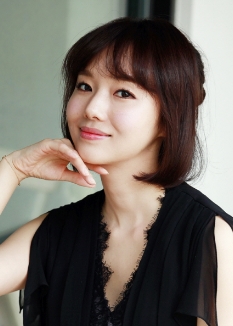Born in 1980, Lee Junghyun grew up as a fan of the legendary pop singer Seo Taiji and long nurtured the dream of following in his steps. Her life took an unexpected turn when her high school teacher recommended her to audition for Jang Sunwoo’s <A Petal> (1996). Eventually landing the lead role, her performance as a teenager suffering from PTSD following the army crackdown on the 1980 Gwangju uprising who gets abused by the people she encounters left no one indifferent, and so she naturally dominated the award season, nabbing Best New Actress from the Grand Bell Awards, the Blue Dragon Film Awards, as well as the Korean Association of Film Critics, at the age of 16. Incidentally, that film also allowed her to make her singing debut, as she recorded for the soundtrack a cover of the title song, originally composed by Shin Junghyun.
After starring in a few other movies such as <Maria and the Inn> (1997) and moving to television series, Lee decided to dedicate herself to her long-held dream. In 1999, her appearance in the music video for dance trio Goofy’s <The Rule of the Game> becoming the talk of the town, she was approached to feature on Cho PD’s title song <Fever>. Later that year, the release of her first album, titled <Let’s Go to My Star>, was the biggest musical sensation of the year, as it introduced techno music in Korea with charts toppers like “Wa” and “Change”, earned her the title of “Female Warrior of Techno Music.”. Also noteworthy is the fact that one of the tracks also featured Psy, a couple of years before he made his own debut. She repeated the feat in 2000 with her second album, with one of her songs being included in the horror movie <Harpie>, in which she had the leading role. This would be her last big screen appearance for more than ten years, as she focused almost exclusively on her music career, releasing five full albums in the following decade. Still, she added to her filmography a couple of roles on Korean television (<Beautiful Days> and <The Great King, Sejong>), but also in China (<A Beautiful Mind> on Beijing TV in 2003 and <Confucius> on CCTV in 2010) as she became there one of the most widely recognizable faces of the Korean Wave.
After she made her big-screen comeback in <Night Fishing> (2010), a Korean animism-themed short directed and filmed (with an iPhone) by Park Chanwook and his brother Park Chankyong that opened at the Berlinale, Lee began a new chapter in her career, this time entirely dedicated to films, as she showed a new depth as a performer in <Juvenile Offender>, which debuted at the Toronto International Film Festival. She followed this up with the war epic blockbuster <Roaring Currents> and another lead role in the indie smash <Alice in Earnestland>, which won her the Best Actress prize at the Blue Dragon Awards and the Wildflower Film Awards Korea. She then rose to fame again after landed a leading role in both Ryoo Seungwan’s hit historical drama <The Battleship Island> (2017) and Yeon Sangho’s <Peninsula> (2020), the follow-up to <Train to Busan>. Not afraid to challenge herself with unexpected and bold choices, in 2020 she also starred in the silly sci-fi comedy <Night of the Undead> (2019), playing a housewife who suspects her husband to live a double life only to discover that he is an alien, and an indestructible one at that. In 2022, she reunited with Park Chanwook in <Decision to Leave>, sharing the screen with Park Haeil and Tang Wei, before she headlined <Limit>, playing a police officer who tracks down a kidnapper by posing as the mother of the abducted kid, until her own child gets kidnapped as well.
Less













